
Cat Town in 2024 is celebrating its 10th Anniversary as America’s first cat café, where visitors can not only enjoy a hot cup of coffee or tea and a nosh, but also do so in a spacious “free-roaming room” in the company of felines. Cat Town, located at 2869 Broadway in Oakland, is so much more, though, than a relaxing space to hang out with cool cats. It is a pet adoption service focused on transforming the approach to saving shelter cats, reducing euthanasia nationwide. Its focus is to find loving homes for cats who are considered unadoptable in the traditional rescue model.

Cat Town provides specialized support for cats with more complex needs. This includes seniors, scared older kittens, and cats requiring emergency medical care. It was the vision of founder Ann Dunn, who is now the Director of Oakland Animal Services. (The San Francisco Bay Times shared her story recently: https://tinyurl.com/3pf4he2h) Executive Director Andrew Dorman (no relation to Anne Dorman, acknowledged in this section) since 2020 has been at the helm of Cat Town. He has a passion for animal welfare that is shared by his dedicated, hard-working staff. A member of our Bay Times team recently visited Cat Town and learned more about it from Quinn White, the organization’s Development & Deputy Director.
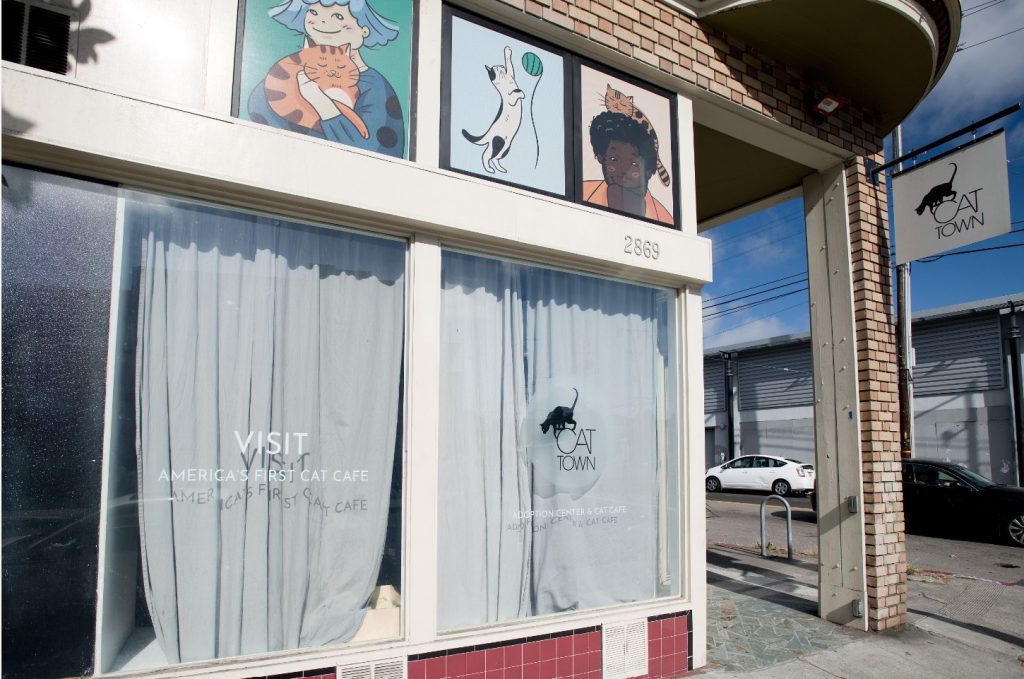

San Francisco Bay Times: There are so many beautiful, sweet felines at Cat Town. How many cats are in the Oakland space now, and how do you determine which ones go into the RAWR Coffee Bar?
Quinn White: About half of Cat Town’s cats reside in foster homes around the East Bay while they wait to get adopted, and the other half live at our Adoption Center on 29th and Broadway. None of our cats enter the food area of the café, but guests are welcome to bring their food and drinks in during their visit!
We typically limit cats in our free-roaming room to those between 5 months and 5 years old. Kittens younger than this won’t have the necessary vaccines to keep them healthy in a group setting, and cats older than 5 tend to feel overwhelmed by the commotion of the space. Between those ages, we’ve observed that cats are good at sharing resources like food, litter boxes, and attention from guests—and the shy cats tend to learn from the braver cats in the room, eventually becoming confident role models themselves.
If a cat isn’t a good candidate for the free-roaming room, they’ve always got a spot in our Studios, which are little private rooms we use to support cats who don’t like other cats, cats who might be sick or very shy, and cats who need extra support from our trained volunteers to get ready to adopt. We have about 30 cats on site at any given time, but not all of them are available to visit.
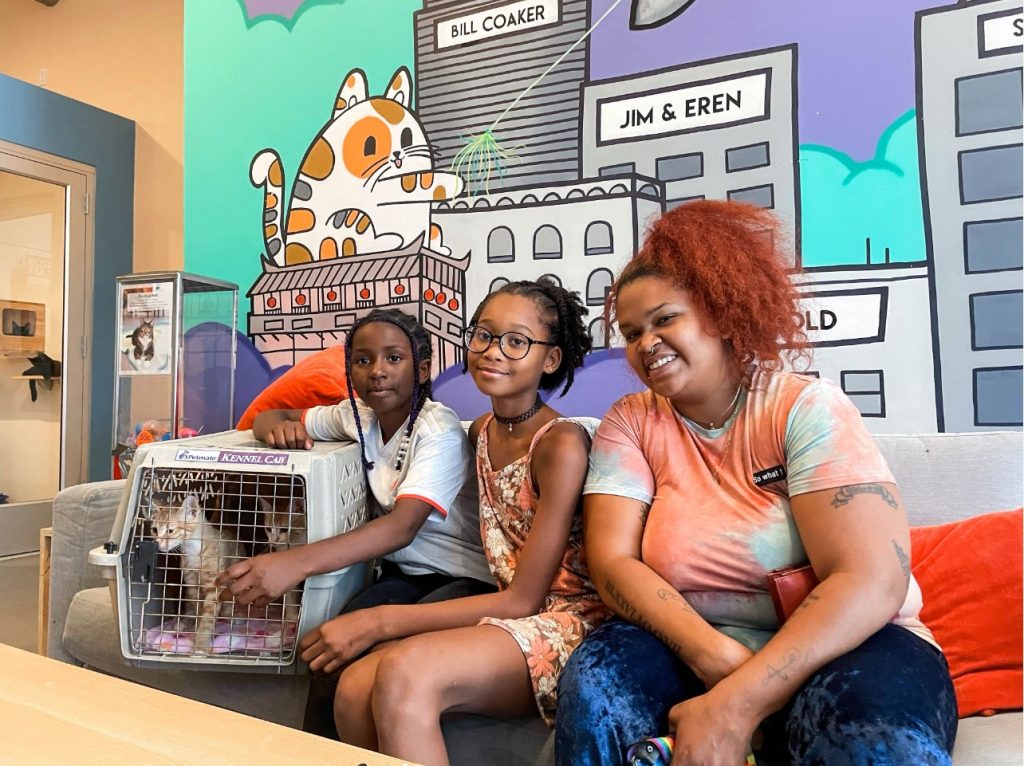
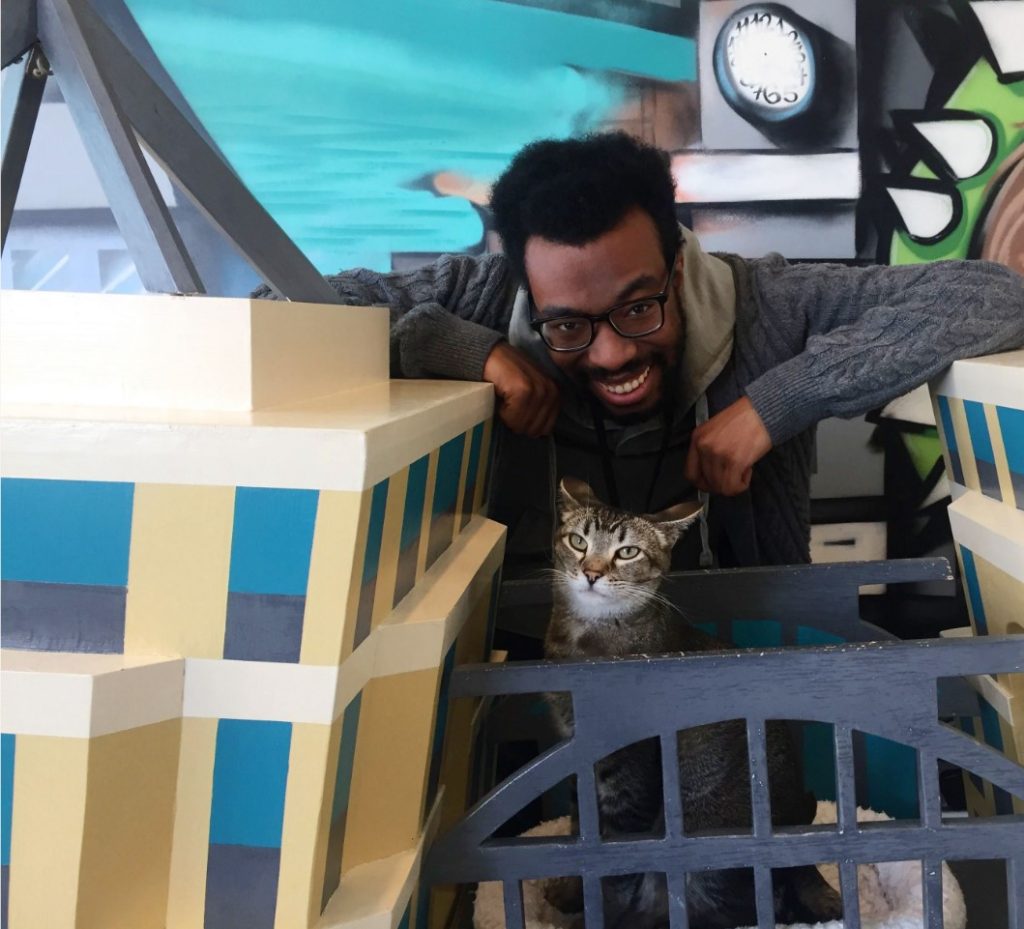
San Francisco Bay Times: We appreciate that you take in senior cats, scared older kittens, and cats requiring significant medical care. Do you also sometimes take in cats that have been at Oakland Animal Services (OAS) for a long time? When a member of our team recently visited OAS, there were so many incredible cats up for adoption.
Quinn White: Yes! We do a weekly walkthrough with their team to identify which cats need our support the most, so we can jointly prioritize how we allocate our resources. That includes cats who’ve been up for adoption, or who haven’t had any interest from other transfer partners for one reason or another. If a cat stays in a cage for too long, they can become stressed, so getting those cats out of cages and into a foster home or our cage-free adoption center really helps those cats be their best selves, so they can get adopted.
San Francisco Bay Times: Do all of the cats at Cat Town come there through OAS?
Quinn White: Most of the time, they do! Oakland Animal Services has been an incredible partner since our inception, and they’re our main partner when it comes to taking new cats into our programs. We also take cats from other local shelters and other rescues whenever we have the capacity to do so.

San Francisco Bay Times: Describe some particular cats who are at Cat Town now, either in the Oakland facility or being fostered. We love how each has a unique personality, look, and more.
Quinn White: We’ve always got special cats in our care! Here are just a few:
Carmen Sandiego is a 10-year-old gray and white cat with a little pink nose who loves people. We’re helping her with some reported litter box issues (and have seen no problems in our care) and got her dental care. Now that she’s feeling better, she makes marching biscuits and sky biscuits, and loves to curl up in a lap (where she continues to make biscuits).
Five-year-old Neeson will become your shadow once he gets to know you, and he can’t be beat when it comes to playing with wand toys. He loves leaping in the air for them, scrambling after them, hunting them, and parading with them in his mouth. You’ll be so proud of him when you see his skills in action, and your heart will melt when he sleeps at the foot of your bed every night.
Cosette and Marius are a sweet pair of 10-month-old tabbies. They start off shy, but are always sweet. Like his namesake, Marius really watches over Cosette, checking on her after playing with other cats, and cuddling her in her hidey-bed. He even seems to have a white shield on his chest fur. Cosette is a gentle little lady, but if you can find her while she’s hiding, she’ll let you softly pet her cheeks.
Ollivander and Pip are in foster care, and are on the lookout for an extra-patient, extra caring adopter. They’re a little older at 8 and 11 years, and they’re shy cats who haven’t had a ton of stability in their lives. Ollie’s a big sweetie once he feels safe, and Pippin becomes a silly, playful little cat once he trusts you. He also might be obsessed with treats. These two really love each other, which will just melt your heart.
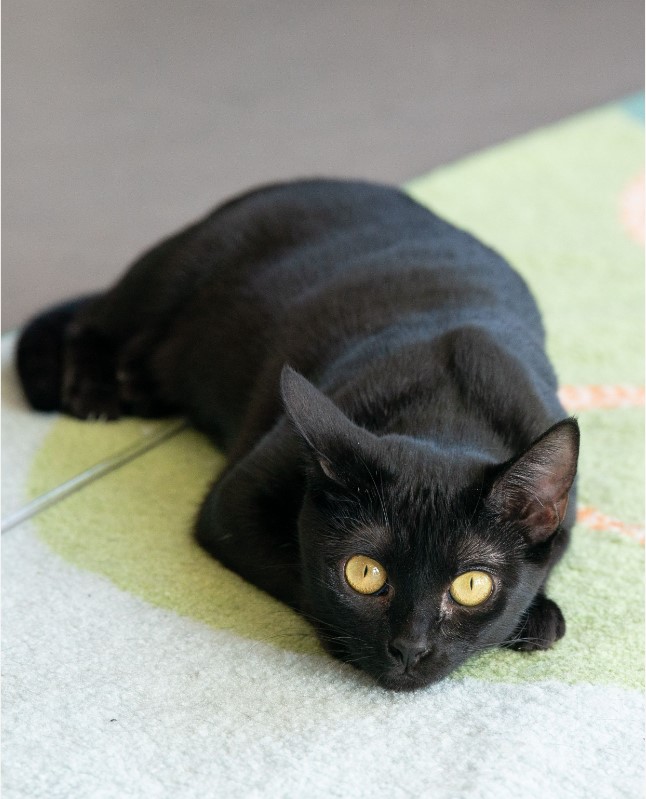
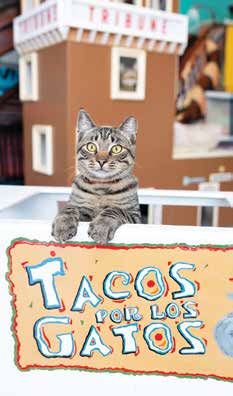
San Francisco Bay Times: You have a section on your website for “cats building confidence.” Please share how those cats are socialized.
Quinn White: Socialization is a spectrum: on one end, you have super friendly cats and on the other end, you have cats who want nothing to do with humans. We have a variety of techniques we can use to help them build trust. Our trained volunteers can bribe them with food or play, and by consistently pairing those positive experiences with proximity to people, or even touch, we get them to let their guard down a little. Once they do that, it’s often just a matter of time before they realize they actually like it when we pet them. We use positive reinforcement to encourage (or discourage) behaviors, and we treat each cat as an individual, reading their cues to help them feel safe on their own terms.
We’re also quite lucky to have an incredible behaviorist on our team—Dilara Göksel Parry, our Program Director. If a cat needs to unlearn old habits, she creates special plans for them that work wonders. She helped us develop our Forgotten Kitten Program, and last year, led a pilot program at Cat Town to help us discern if a cat is actually a feral cat, or just incredibly fearful (https://tinyurl.com/2zb76bc9).
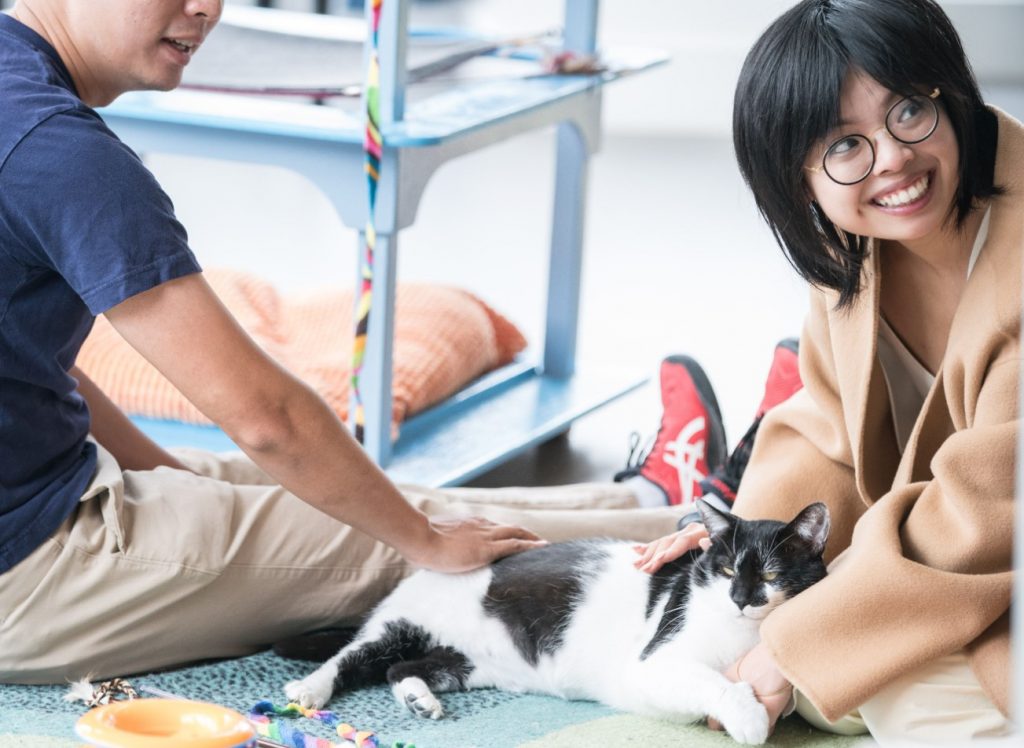
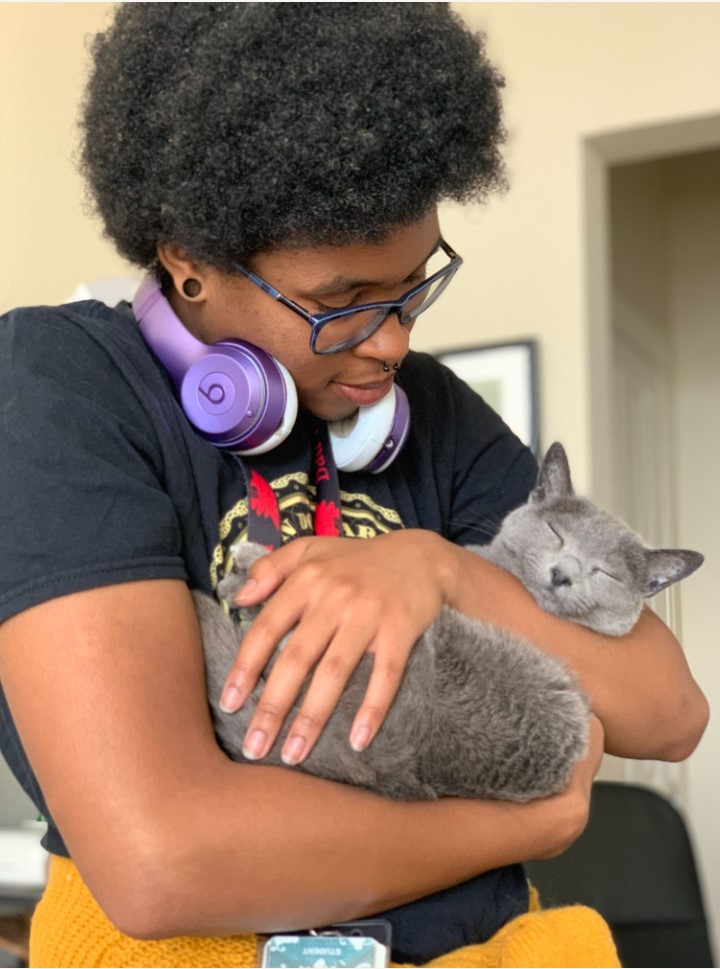
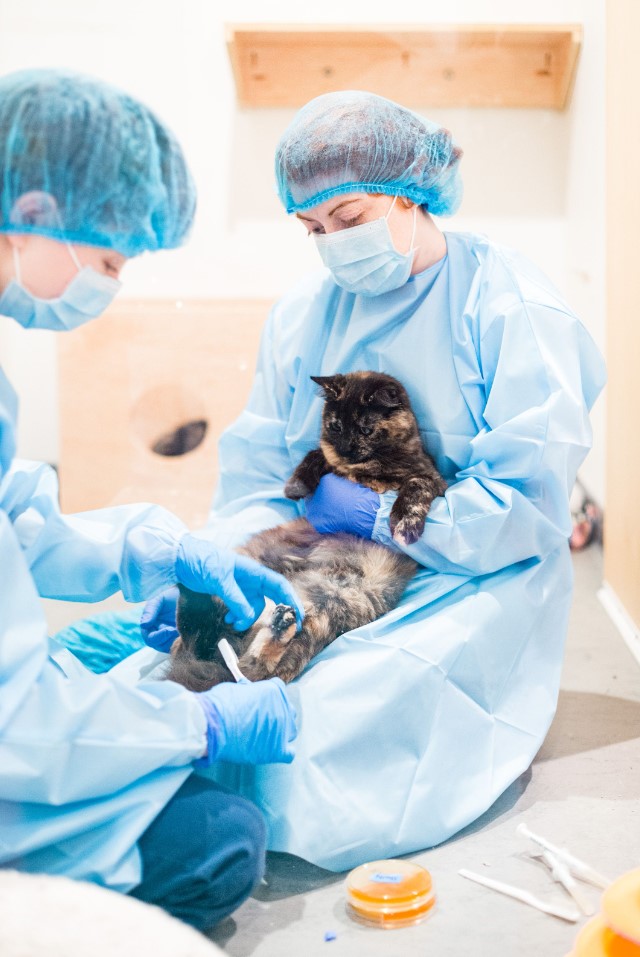
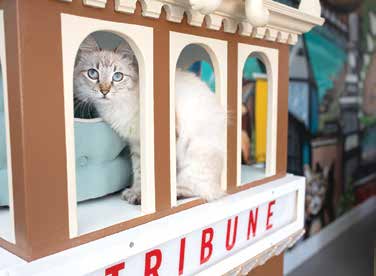
San Francisco Bay Times: How did you first become involved in Cat Town?
Quinn White: I got involved as a volunteer in 2014! My husband and I recently had our cat pass away, and were beyond heartbroken, so one of my coworkers suggested that I try volunteering at Cat Town to help mend my heart. I did, and it was love at first sight for me. I fostered, I fundraised, I wrote newsletters, I helped guests visit cats, and more. There’s just something electric about this work and the community behind it. Cat Town’s culture of trying new approaches, taking care of one another, and celebrating incremental wins is something I’ll never get tired of. Once you see it up close, it’s obvious this community is really special. I became part of the amazing team of staff here six years ago, and I never looked back!
San Francisco Bay Times: What happened to the Cat Man of West Oakland, Adam Myatt?
Quinn White: Adam is a great friend to Cat Town, and is working on other cool projects these days. He opened America’s first cat café with Ann, our founder, and a lot of heart and hard work went into making it a success. We’re grateful for his friendship and proud to have that shared history. We love the Cat Man!
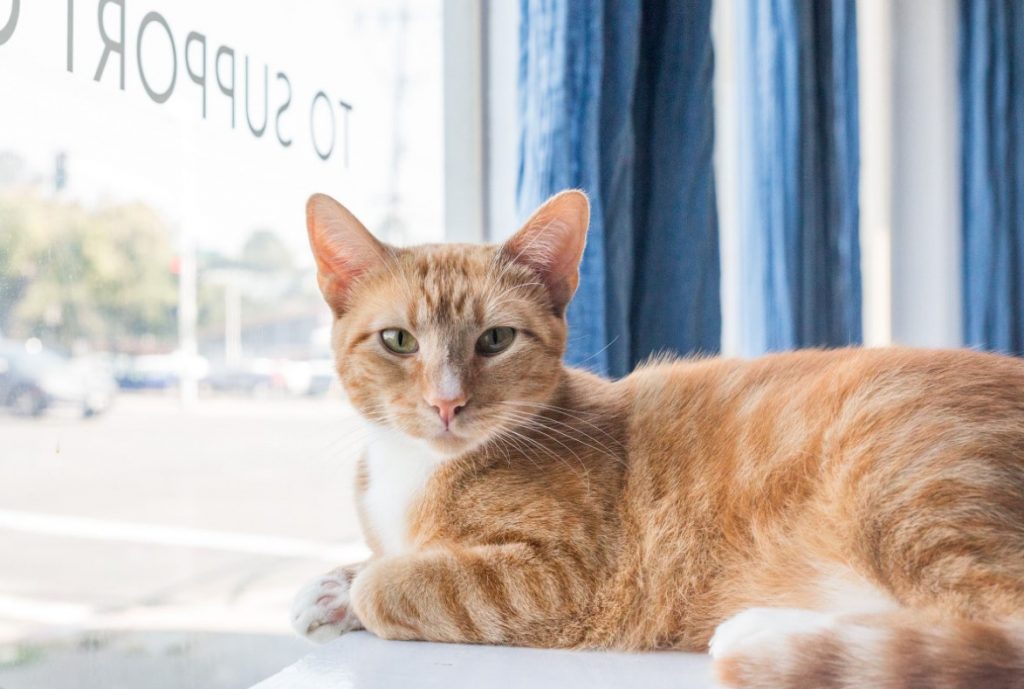
San Francisco Bay Times: One of many reasons that we at the San Francisco Bay Times love Cat Town is that your organization scores highly in terms of support of the LGBTQ community and overall diversity. How does your organization connect with the LGBTQ+ community?
Quinn White: Cat Town has always prioritized being a welcoming space for everyone—staff, volunteers, fosters, adopters, guests, donors, and our online followers as well. As a result, we have a pretty diverse community! In our most recent volunteer survey, a little more than a quarter of respondents identified as LGBTQ+.
Part of how we ensure that we welcome everyone is taking a low-barrier approach to adoptions. We start from a place of trust, believing that everyone seeking to adopt from us has good intentions. We match individual people with individual cats. We also have a case manager program to offer extra support to our adopters after they bring cats home, so that we can give families of every experience level their best chance at success. More people adopting cats means more love in our community, and that’s a win for everyone.
San Francisco Bay Times: Cat Town launched the first cat café in the U.S. in 2014. Are there now other such places in the U.S., or internationally?
Quinn White: Our team always seems to make a point of visiting other cafés when we travel, and collectively we’ve been to cat cafés in New York, Montana, Oregon, North Carolina, France, Scotland, Japan, and more! Cat cafés seem to be everywhere now. It’s great! Since we were the first in America, we still get a lot of questions from folks hoping to open up a cat café in their own communities, and we love helping with advice.
Cat Town’s version of a cat café is a spin on Japan’s cat cafés, which offer guests a chance to de-stress with friendly resident cats. With our model, and many others across the country, the goal is adoption—more focused on the comfort of our cats. When that’s the focus, cat cafés are a lower-stress option for cats than waiting in a shelter cage. That makes it easier for adopters to picture the cat in their home, and gives them a better sense of what they’ll be like when they get there. Of course, we’re still a shelter—housing lots of animals means we keep it extremely clean to prevent the spread of disease. A café really doesn’t compare to a home, so that’s where we want our cats to land.
That said, part of the magic of a cat café is that it is a low-pressure place to meet cats! When people think of going to a shelter, it’s not necessarily a cheery place they picture. Some people will just avoid going altogether for that reason—but a cat café? The cats are clearly having fun. You can visit and feel good about leaving without adopting, or luck out and make a new best friend!
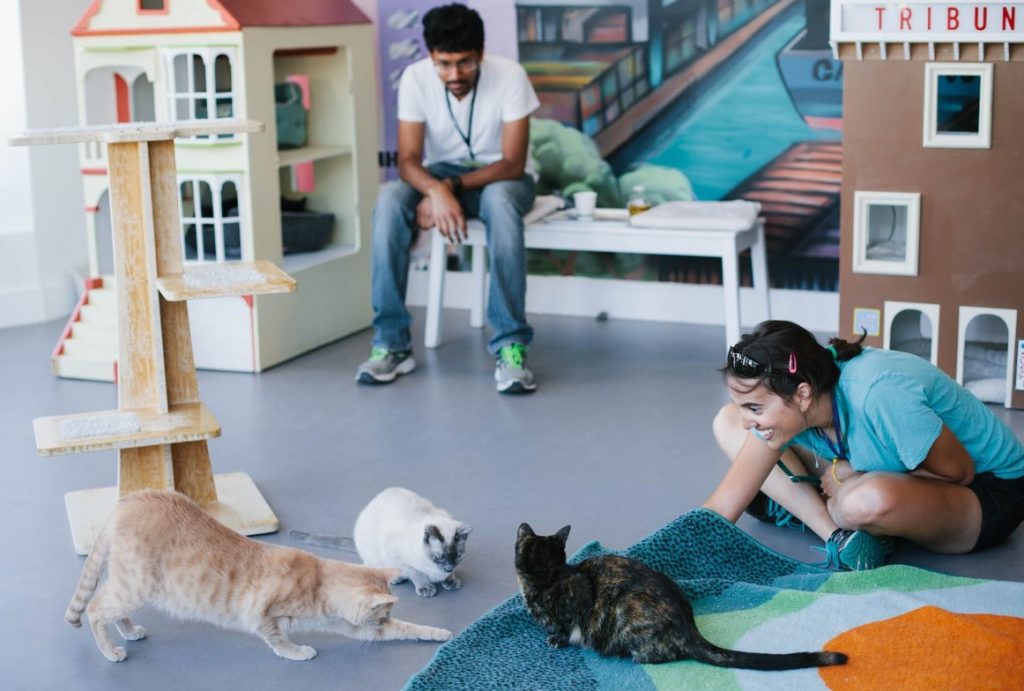
San Francisco Bay Times: The events that you hold sound amazing—everything from Paw n Draw to Meditation With Cats. What events are you planning for the months to come?
Quinn White: Thank you! We took a bit of a hiatus on events with COVID-19, but we’re working on building them back up this year. We’re hoping to do more yoga, more educational workshops, and more private parties to start! Our recent Trap-Neuter-Return workshop with Feral Change had a lot of demand, so we’ll do more of those for sure.
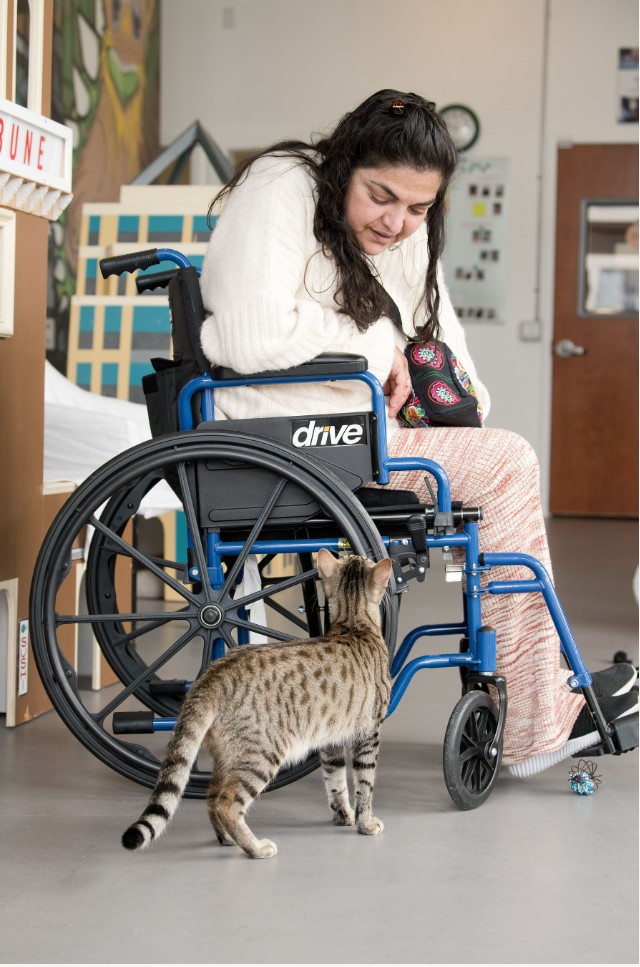
San Francisco Bay Times: What are the greatest challenges that you are now facing at Cat Town, and how might our readers help you with them?
Quinn White: Right now, we’re seeing a greater need for our work than ever—it really feels like Oakland’s cats are at a crossroads. Cat Town’s work has helped decrease the euthanasia rate for shelter cats in Oakland dramatically—from 42% in 2011 to less than 10% since 2018. We’ve helped maintain a no-kill status for more than six years, but the shelter’s cat population rose by 55% from what we were seeing just two years ago. We focus on helping the city’s most vulnerable shelter cats: seniors, those with treatable conditions, and critically ill cats. Those cats can also be the costliest to care for.
Making a donation today, or becoming a monthly donor, means we can do more to keep up with the increased need for our services. And if you’ve been on the fence about adopting? Now is a great time to take that leap! We have so many wonderful cats, and each of them has a special story—a unique life they’ve lived. They’re all waiting to keep that story going, and by adopting a cat, or a pair, you can make your life so much richer while also helping make space for another cat in need!
San Francisco Bay Times: What are your plans for the future with Cat Town?
Quinn White: This year, we’re celebrating 10 years as America’s first cat café, and our 13-year anniversary as a nonprofit in just a few days (March 19!), but we haven’t spent those years idly. We’ve tried new approaches and found new ways to support the cats who need us most. Socializing scared older kittens in our Forgotten Kitten Project. Making extra space for all these incoming shelter cats by helping younger kittens find homes at Pet Food Express. Doing more to support fearful adult cats with our Feral or Fearful program. Teaching nonprofits across the nation how to help these same cats in their own communities with our Apprenticeship program at Maddie’s University.
When we look to the future, we want to keep doing more. We’d like to help more cats with ringworm, which is so simple to treat outside of a shelter setting! We’d like to expand our cat behavior services, and maybe even create programs that help people keep their cats during hard times. With the experience we have working with cats, there’s a lot we can do to help them in our community, and doing all we can is the dream.
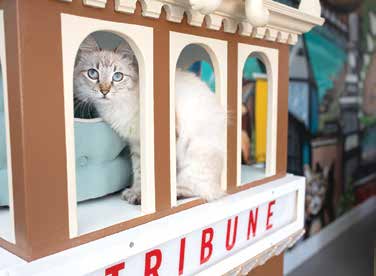
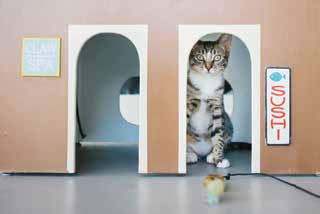
https://www.cattownoakland.org/
Supporting Small Businesses in the Castro and Beyond
Published on March 7, 2024
Recent Comments